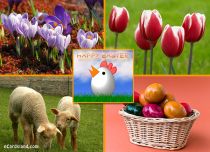New Spring (1831)
Leise zieht dwch mem Gemiit
Soft, aloft, the bells do ring,
Gentlest thoughts they sing me.
Ring and sing, my song of spring,
Through the blue sky wing thee
To the house of budding flowers,
Borne by Echo fleeting.
Shouldst thou chance to see a Rose
Say, I send her greeting!
Die Rose duftet
The Rose is fragrantyet if she doth know
Her sweet scent's meaning, if the Nightingale
Herself feels aught that through Man's soul doth flow
At sound of her enraptured madrigal,
I know not, I. Yet often much offence
We find in truth! If Rose and Philomel
Do but pretend emotion, evidence
We have enough that such lies profit well.
Wie des Monies Abbild zittert
As the moon's fair image trembles
In the troubled, tossing tides,
Though herself, serene and stately,
O'er heaven's vaulted pathway glides,
Even so glidest thou, Beloved,
Still, serene; thine image taken
In my heart but seems to tremble,
For my heart is tossed and shaken.
Es war ein alter KSnig
There was an aged monarch,
His heart was sad, his hair was grey;
Alas, poor fool, he took him
A wife that was young and gay!
There was a handsome page-boy,
Light was his heart and gold his hair;
The silken train he carried
Of that queen so young and fair.
Dost thou not know my story,
So sweet, so sad to tell?
Death was the lovers' portion
Because they loved too well.
Durch den Wald im Mondenscheine
Through the forest, in the moonlight,
Late I saw the elfin train
Pass with hunting-horns resounding,
Heard their horse-bells ring again.
Golden antlers, nobly branching,
Crowned each little snow-white steed;
Like a flight of wild swans homing
Through the glades they passed at speed.
Smiled the Fairy Queen upon me
Smiled, and looked, and passed me by.
Does her smile mean love's renewal?
Does it mean that I must die?
Die holden Wunsche bliihen
The tender wishes blossom,
And wither at a breath,
And bloom again, and wither
Until they cease in death.
'Tis knowing this that saddens
For me the love most blest:
My heart has learned such wisdom
That it bleeds within my breast.
Poems by Heinrich Heine
















